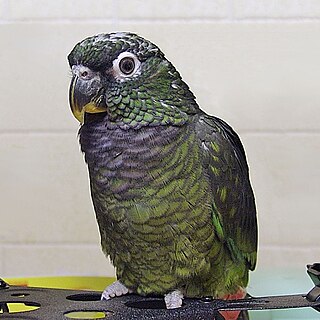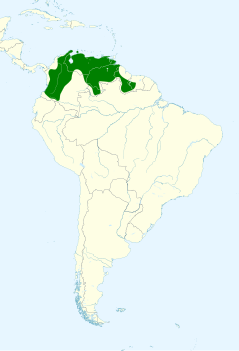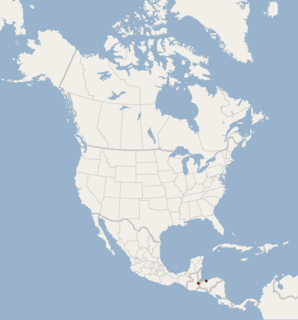
Emballonuridae is a family of microbats, many of which are referred to as sac-winged or sheath-tailed bats. They are widely distributed in tropical and subtropical regions around the world. The earliest fossil records are from the Eocene.

The big red bat is a species of vesper bat from South and Central America.

The riparian myotis, is a vespertilionid bat species from South and Central America. It is a medium-sized bat compared to other South American myotis.

The white-throated round-eared bat is a South and Central American bat species found from Honduras to Bolivia, Paraguay and Brazil. It creates roosts inside the nests of the termite, Nasutitermes corniger. It thrives on a mainly insect-based diet, focusing on the surfaces of foliage to hunt, and also eats fruit and pollen. It has a very wide range and is a common species over much of that range, so the International Union for Conservation of Nature has assessed its conservation status as being of "least concern".

Fischer's little fruit bat is a bat species from South America. It is found in Brazil, Colombia, Ecuador, Peru and Venezuela.

The Neotropical fruit bats (Artibeus) are a genus of bats within the subfamily Stenodermatinae. The genus consists of 12 species, which are native to Central and South America, as well as parts of the Caribbean.

The scaly-headed parrot is a species of bird in the family Psittacidae, the true parrots. It is also called scaly-headed pionus, Maximilian pionus, Maximilian parrot, Maximilian's pionus, or Maximilian's parrot.

The great-billed seed finch is a species of bird in the family Thraupidae. Its natural habitats are subtropical or tropical moist shrubland, swamps, and heavily degraded former forest. They are found in two separate general populations, one in the northern Amazon rainforest and the other in the Cerrado. They live in flooded areas with nests low to the ground. The adults express strong sexual dimorphism. Males are black with white under wing-coverts and ivory white bills, and the females are generally light brown with white under wing-coverts and black bills. Both the male and female have very large, thick bills. The great-billed seed finch has a melodious call, which has made it a target for trapping.

The large fruit-eating bat is a species of bat in the family Phyllostomidae. It is found in the South American neotropics, specifically in the countries of Colombia, Guyana, and Venezuela. The large fruit-eating bat is one of only a few microbats that engages in the eating of leaves.

The Honduran fruit-eating bat is a species of bat in the family Phyllostomidae. It is found in El Salvador, Honduras, and Nicaragua.

The Guianan bonneted bat, or Thomas's mastiff bat, is a species of free-tailed bat from South America. It is poorly understood, because it is difficult to capture, and may be one of the rarest Neotropical bats.

Centronycteris is a genus of sac-winged bats. It contains two species:

The Thomas's shaggy bat is a bat species from Central and South America. It was previously included in the shaggy bat but Simmons and Handley (1998) showed that the species were distinct.

Menchu's little yellow bat is a species of vesper bat found in Central America. It was described as a new species in 2012.
















